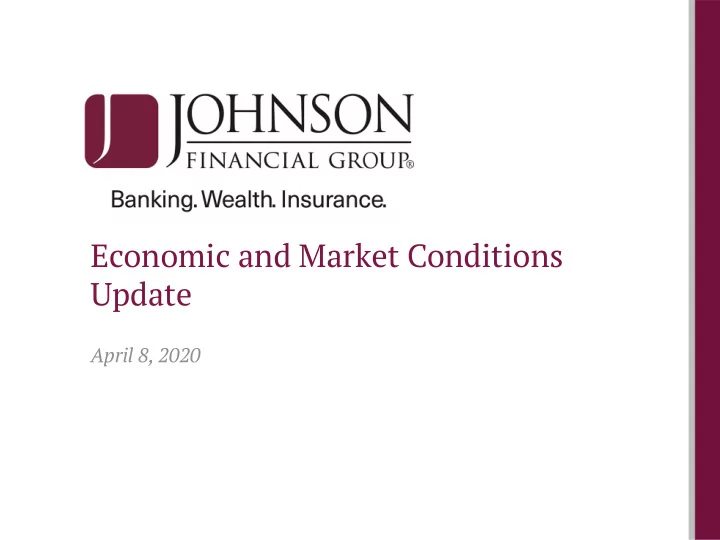

Economic and Market Conditions Update April 8, 2020
Agenda • Pandemic and the Economy • Stimulus Plan • Financial Planning Insights • Stock and Bond Markets • Q&A 2
Scenario Analysis and What to Watch Presented by Brian Andrew 3
Scenario Analysis • Best Case » Virus curve peaks mid-April to mid-May » Stimulus provides bridge to improving economy » Fed’s efforts maintain stability » Oil economy doesn’t crater » Faster development of treatment and vaccine • Worst Case » Virus peak comes late May, wave 2 in November with no treatment or vaccine » Economic damage worse and longer lasting » Troubled consumer and corporate debt increases bankruptcies, reduces liquidity and causes credit crisis Source: BNY Mellon 4
Early Recovery In China Dates around the Lunar New Year holiday are compared on a lunar calendar basis Sources: Capital Economics, Refinitiv 5
What Will The Recovery Look Like? Sources: Maddison, Refinitiv, Capital Economics 6
Cues From The Bond Market Source: Bloomberg. April 6, 2020 7
Boom! Economic Stimulus Summary Global Monetary And Fiscal Stimulus To Fight COVID-19 Impact 2020 Feb to Apr Central Bank Liquidity Central Bank Govt Fiscal Stimulus Injection and Govt Liquidity Injection Fiscal Stimulus $ Tln % GDP $ Tln % GDP $ Tln % GDP U.S. $2.50 11.7% $2.71 12.7% $5.21 24.3% Eurozone $1.10 8.3% $0.48 3.6% $1.58 11.9% Japan $0.20 3.9% $0.99 19.2% $1.19 23.1% U.K. $0.25 9.0% $0.07 2.4% $0.31 11.4% China $1.27 8.9% $0.54 3.8% $1.81 12.8% Others* $0.62 $1.63 $2.25 Total $5.94 6.9% $6.42 7.4% $12.36 14.3% *incl RoW and ADS, IMF, WS Sources: Cornerstone Macro as of 4/3/2020, Federal Reserve 8
Help From The Fed • Reduced Fed Funds interest rate to 0%-.25% • Purchasing Treasuries and Agency MBS in “ amounts needed” (known as quantitative easing) • Primary and Secondary Market Corporate Credit Facility Term Asset Backed Loan Facility • Money Market and Commercial Paper Liquidity Facility 9
Stimulus Plan 10
Planning In Times of Turmoil Presented by Joe Maier 11
Understanding the Behavior • Neurological • Loss Aversion • Regret Aversion • Herd Mentality • Add it all up- Loss is painful, loss due to our unique actions is more painful- pain is lessened by following the crowd 12
What Do We Do • Do not avoid emotions, lean into them • Do not focus on the wrong emotions, focus on the right ones • Revisit your story • Control what you can control • Seek guidance 13
Legacy Planning • Strategy to take care of the people you care about • Right people, right property, right time • Right people empowered to make the right decisions with the right information • New world - health care decisions • Financial decisions (especially in times of turmoil and chaos) 14
Stock Market Update Presented by Jason Herried 15
Stock Market Recovery Source: Cornerstone Macro 16
Complacency or Optimism Source: CSM Client Survey March 27 – 30th 17
Equity Positioning 3.31.2020 Equ quity Ex Exposure : The COVID-19 virus has dramatically changed the outlook for the economy and earnings. Volatility exploded in March and remains high based on the high degree of uncertainty. Monetary and Fiscal policy offer support, but the significant damage done by the decline will likely mean that the bottoming process may take weeks or months to complete. U.S. Lar Large ge vs vs. Small mall: While a highly volatile environment favors large companies, valuation levels support small and mid cap (smid) stocks relative to large cap. It should also be noted that the small cap universe is prone to companies with negative earnings. Therefore, we favor strategies that have a larger average market cap, are of higher quality or have demonstrated an ability to add value through stocks selection. Val alue vs vs. Growth: The disruption to economic growth removes a key thesis point for the outperformance of value in 2020. Furthermore, lower interest rates and a price war in the oil market add to the pressure. Significant performance dispersion and better valuations on normalized earnings provide some support. U.S. vs vs. Inte ternat ational al: Superior capacity for fiscal stimulus and a more defensive sector composition drove our decision to overweight the US over international. Furthermore, the US Dollar tends to be strong in a risk off environment and therefore increase the risk to international investments. Inte ternat ational al Developed vs vs. Eme merging Mar arkets ts: China was the epicenter of the COVID-19 virus and appears to be the first to begin the healing process. This fact has led to relative strength for emerging markets in recent months. The path forward will depend on the strength of the post crisis rebound and the degree that US Dollar strength pressures emerging market currencies. Longer term, we believe attractive investment opportunities exist to capitalize on the growing middle class in that region. 18
Stay Informed • Visit our website to learn more » Stay up to date on the latest market conditions and planning insights • www.johnsonfinancialgroup.com/resources/insights » Stay up to date on how we are responding to the COVID- 19 pandemic: • For individuals – www.johnsonfinancialgroup.com/covid-19 • For businesses - www.johnsonfinancialgroup.com/business- covid-19-coronavirus/ 19
Disclosures This content is for informational purposes only and is not to be taken as advice or a recommendation to buy or sell any investment. Forecasts, figures, opinions or statements of market trends are subject to change without prior notice. All information presented is considered accurate at the time of publication but no warranty of accuracy is given and no liability with respect to any error or omission is accepted. Charts and graphs, in and of themselves, should not be used as a basis for investment decisions. Past performance is not a guarantee of future results. Johnson Financial Group is a privately-held financial services company and marketing name for its subsidiaries Johnson Bank, Johnson Wealth, and Johnson Insurance. Johnson Financial Group and its subsidiaries do not provide legal or tax advice. 20
Recommend
More recommend